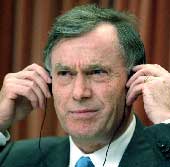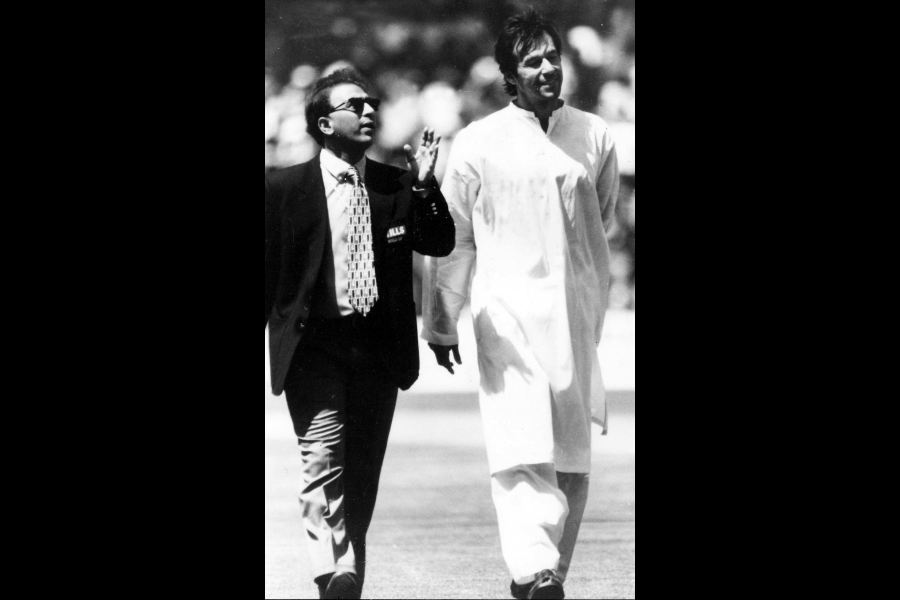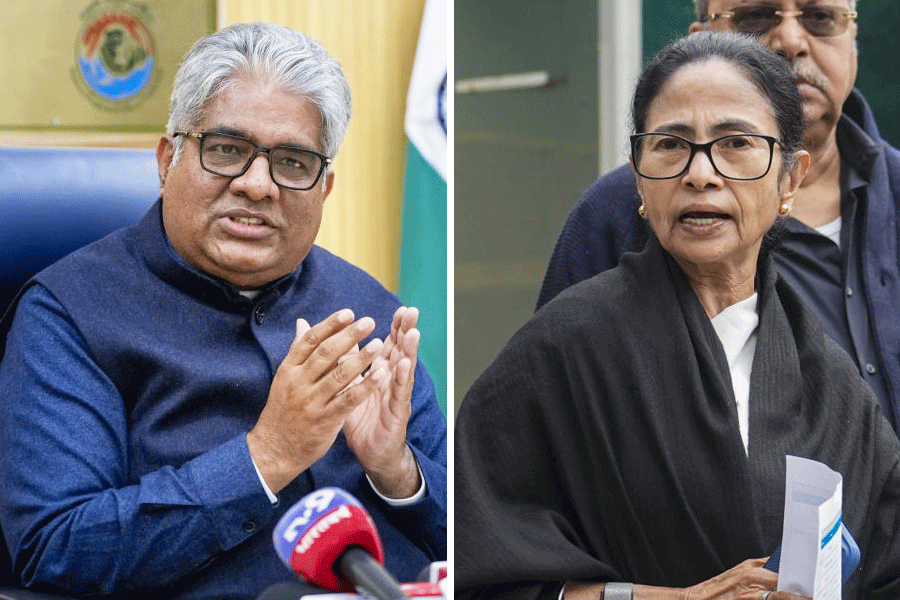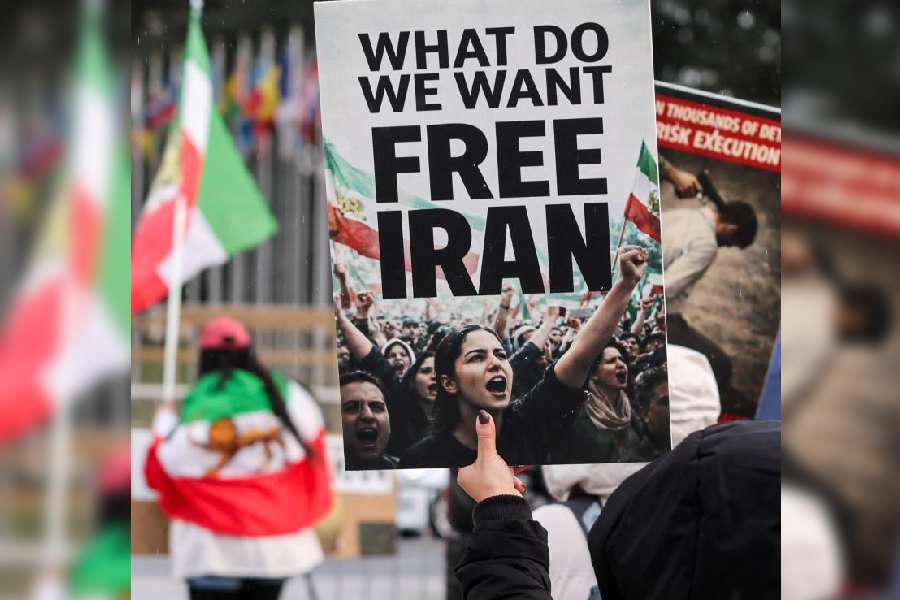|
|
At the time of writing, there is a vacancy at the top slot in the International Monetary Fund. Horst Köhler, managing director of the IMF, has left to seek election as president of Germany. The nearest precedent is the elevation of Mocem Querishi — a distinguished Pakistani, who was senior vice-president, or equivalent of the International Bank for Reconstruction and Development — to the prime ministership of Pakistan in the Nineties. Köhler’s move is to a more prestigious, but less functional, assignment, removed from the strife of the maddening world of monetary squabbles and crises in global currencies.
Talking of the managing director of the IMF, one is confronted by a unique convention that it is usually reserved to be filled by a European. When the IMF was formed, the obvious choice would have been Harry Dexter White, the brilliant American economist, who, together with Lord Keynes, had drawn up the structure of the Brettonwoods institution. The United States of America had its eye on the leadership of the World Bank, which was apparently considered the more prestigious institution as it had more funds to give away. The US, therefore, denied itself the right to man the top post in the IMF. It is recorded that Lord Keynes himself approached the then finance minister of Belgium, Camille Gutt, to take up the managing directorship of the Fund. Gutt readily agreed, and so was born the convention that the IMF’s MD was to be treated as a European preserve, although the US plays a role in okaying the final choice.
When Köhler was made the MD of the IMF in 1991, his immediate predecessor Michel Camdessus, had been in office for an eventful 13 years, covering the southeast Asian crisis and the Russian meltdown. Camdessus himself had earlier been governor of the Central Bank of France when his nomination was put forward and went through. At that time, the other contender was O. Ruding, who had been finance minister of the Netherlands and had taken an active interest in IMF matters as chairman of the Interim Committee.
I recall clearly the diplomatic game played at the time. Ruding had thrown his hat into the ring, buoy- ed by promises of his prime minister, who had obtained the informal support of India’s then prime minister, Rajiv Gandhi. Ruding was so keen to solicit India’s formal support directly that he flew to New Delhi to call on the then finance minister, V. P. Singh, and the PM himself. It was my privilege to receive him at Delhi airport.
There was, however, a tragicomedy of errors in the nomination of candidates for the MD of the IMF. The US had, in a clear diplomatic move, indicated that whoever got India’s and China’s support from among the two European candidates would have its support. Apparently, India’s then representative at the IMF had wrongly informed China that Camdessus had our support, which, in fact, foreclosed the choice against Ruding, as the US was inclined to go by China and India’s views. China felt that whoever India supported would get its support. Ruding pleaded valiantly for India’s support, but in vain.
The beneficiary of the miscommunication turned out to be Camdessus, while Ruding had to console himself with a position on the board in the mighty Citibank. This was, however, a weak compensation for what he had sought and, no doubt, richly deserved –— the top position at the IMF where he felt he had a role to play. In the event, Camdessus did prove to be a good MD, albeit leaning a bit towards the Washington Consensus. He was, indeed, very helpful to India, especially in handling the 1991 crisis and even before, when he offered a safety-net to India — which we unfortunately refused. The anecdote shows that India can play an important role in the choice of the most important functionary of the international monetary system.
The importance of the current convention regarding the choice being restricted to Europe has to be considered in the light of the growing significance of India and China — not excluding Japan. Why the choice of MD of the IMF should be restricted to a European state is not clear in the changed circumstances. The fact is that Köhler himself had been imposed on the IMF by Gerhard Schroeder. A number of names had been tossed into the fray on the last occasion, although Köhler won finally. Among those considered was the name of Stanley Fischer, an eminent economist, who had served ably as deputy managing director of the IMF for a while. He was supported by a number of African countries because he was originally from Zambia, although he had later become a naturalized US citizen. The US did not favour his name, perhaps because it wanted to retain its hold on the World Bank.
It is obvious that the selection of the IMF top honcho should be more transparent and not be left to the interactions of the power-brokers of Europe. After all, it is only appropriate that the IMF, which preaches proper governance to the rest of the world, should practice it in its own case. The criterion should be confined to competence, based on academic background and hands-on experience in managing the problems of economic transformation, preferably in a developing country. After all, it is in solving problems of the poorer countries that the IMF has to concentrate its attention, not on issues governing the problems of Europe and the US.
Köhler has proved himself to be an extremely competent manager of the IMF’s complex responsibilities, especially where the problems of the developing countries are concerned. He has carefully distanced himself from a doctrinaire insistence on capital convertibility, which unfortunately “distinguished” the latter phase of Camdessus’s regime. Köhler’s test surely came when he had to handle the looming problems of the US’s fiscal deficits, and the pressure sought by the US to be put on China to revalue its currency. So far, Köhler has done his job proud. He has also distinguished himself by a liberal approach to top appointments in the IMF.
He has shown an extremely transparent and open-minded approach to inducting top talent into the IMF, irrespective of country of origin. In particular, his recruitments of Raghuram Rajan as chief economist and of Montek Singh Ahluwalia as the chief evaluator are symptomatic of a meritocratic approach. In earlier regimes, the maximum advance was when Prabhakar Narvekar became deputy managing director of the IMF –—the highest position so far held by an Indian.
The principles of corporate governance, which the IMF believes in for others, should apply equally to the Brettonwoods institutions as to the countries they advise and intervene in. It follows that the choice of the chief executive officer of the IMF should be based not on geopolitical reservation, but on true merit. It should be the outcome of a process of selection that conforms to the “open ness” advocated by the IMF in its advice to the world. India has a legitimate claim to the post. It is widely believed that Chintaman Deshmukh was considered, at the time of inception of the the IMF, a suitable candidate for the post of MD of the IMF. But, that was not to be. In the actual turnout of history, Deshmukh was destined for greater office and service to the nation.
But that does not mean that we should give up trying for the post. We have an excellent candidate both in Manmohan Singh, with his unequalled experience as the originator and implementer of reforms, and also in Montek Singh Ahluwalia, currently with the Fund. It is to be hoped that Jaswant Singh and his deputies will give this suggestion its due consideration. Being in the opposition should not disqualify Manmohan Singh. There have been instances of opposition leaders being nominated for such prestigious positions. For instance, Britain’s Conservative Party nominated a Labour leader for a top position in the European Union. We will be doing our country and the IMF a significant service by putting forward –— and getting elected –— a person of the eminence of Manmohan Singh, provided of course he is willing.











